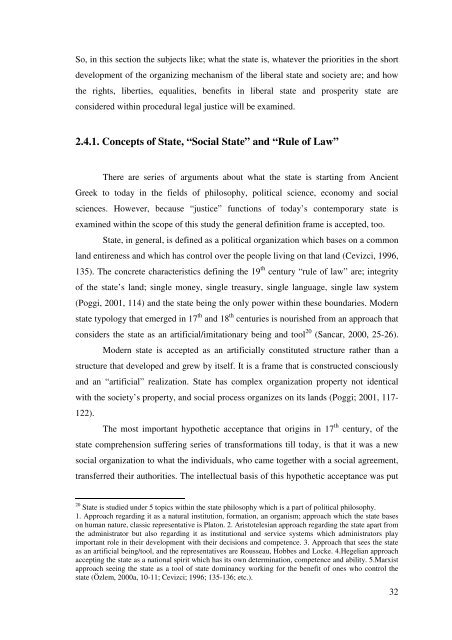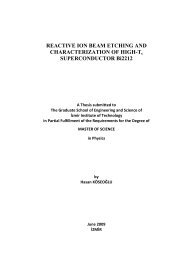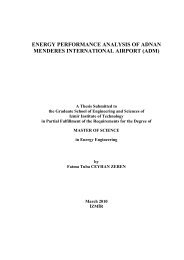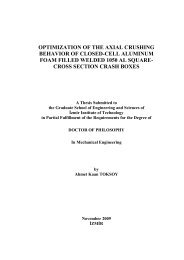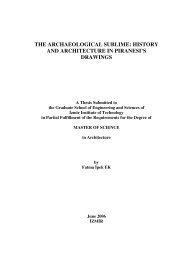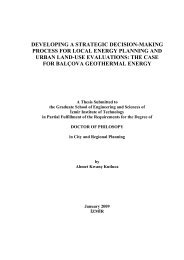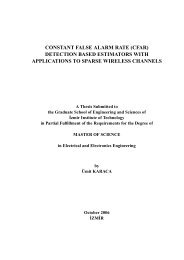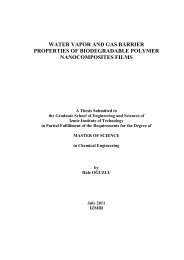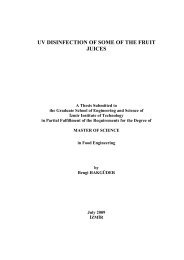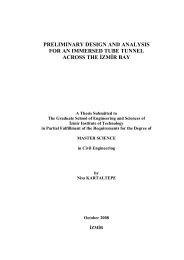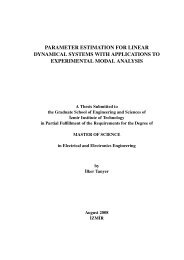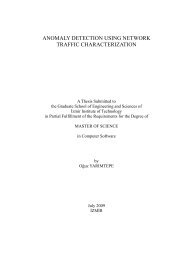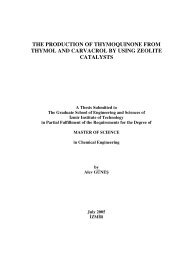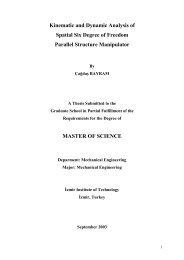a critical evaluation on the concept of justice in planning process
a critical evaluation on the concept of justice in planning process
a critical evaluation on the concept of justice in planning process
Create successful ePaper yourself
Turn your PDF publications into a flip-book with our unique Google optimized e-Paper software.
So, <strong>in</strong> this secti<strong>on</strong> <strong>the</strong> subjects like; what <strong>the</strong> state is, whatever <strong>the</strong> priorities <strong>in</strong> <strong>the</strong> short<br />
development <strong>of</strong> <strong>the</strong> organiz<strong>in</strong>g mechanism <strong>of</strong> <strong>the</strong> liberal state and society are; and how<br />
<strong>the</strong> rights, liberties, equalities, benefits <strong>in</strong> liberal state and prosperity state are<br />
c<strong>on</strong>sidered with<strong>in</strong> procedural legal <strong>justice</strong> will be exam<strong>in</strong>ed.<br />
2.4.1. C<strong>on</strong>cepts <strong>of</strong> State, “Social State” and “Rule <strong>of</strong> Law”<br />
There are series <strong>of</strong> arguments about what <strong>the</strong> state is start<strong>in</strong>g from Ancient<br />
Greek to today <strong>in</strong> <strong>the</strong> fields <strong>of</strong> philosophy, political science, ec<strong>on</strong>omy and social<br />
sciences. However, because “<strong>justice</strong>” functi<strong>on</strong>s <strong>of</strong> today’s c<strong>on</strong>temporary state is<br />
exam<strong>in</strong>ed with<strong>in</strong> <strong>the</strong> scope <strong>of</strong> this study <strong>the</strong> general def<strong>in</strong>iti<strong>on</strong> frame is accepted, too.<br />
State, <strong>in</strong> general, is def<strong>in</strong>ed as a political organizati<strong>on</strong> which bases <strong>on</strong> a comm<strong>on</strong><br />
land entireness and which has c<strong>on</strong>trol over <strong>the</strong> people liv<strong>in</strong>g <strong>on</strong> that land (Cevizci, 1996,<br />
135). The c<strong>on</strong>crete characteristics def<strong>in</strong><strong>in</strong>g <strong>the</strong> 19 th century “rule <strong>of</strong> law” are; <strong>in</strong>tegrity<br />
<strong>of</strong> <strong>the</strong> state’s land; s<strong>in</strong>gle m<strong>on</strong>ey, s<strong>in</strong>gle treasury, s<strong>in</strong>gle language, s<strong>in</strong>gle law system<br />
(Poggi, 2001, 114) and <strong>the</strong> state be<strong>in</strong>g <strong>the</strong> <strong>on</strong>ly power with<strong>in</strong> <strong>the</strong>se boundaries. Modern<br />
state typology that emerged <strong>in</strong> 17 th and 18 th centuries is nourished from an approach that<br />
c<strong>on</strong>siders <strong>the</strong> state as an artificial/imitati<strong>on</strong>ary be<strong>in</strong>g and tool 20 (Sancar, 2000, 25-26).<br />
Modern state is accepted as an artificially c<strong>on</strong>stituted structure ra<strong>the</strong>r than a<br />
structure that developed and grew by itself. It is a frame that is c<strong>on</strong>structed c<strong>on</strong>sciously<br />
and an “artificial” realizati<strong>on</strong>. State has complex organizati<strong>on</strong> property not identical<br />
with <strong>the</strong> society’s property, and social <strong>process</strong> organizes <strong>on</strong> its lands (Poggi; 2001, 117-<br />
122).<br />
The most important hypo<strong>the</strong>tic acceptance that orig<strong>in</strong>s <strong>in</strong> 17 th century, <strong>of</strong> <strong>the</strong><br />
state comprehensi<strong>on</strong> suffer<strong>in</strong>g series <strong>of</strong> transformati<strong>on</strong>s till today, is that it was a new<br />
social organizati<strong>on</strong> to what <strong>the</strong> <strong>in</strong>dividuals, who came toge<strong>the</strong>r with a social agreement,<br />
transferred <strong>the</strong>ir authorities. The <strong>in</strong>tellectual basis <strong>of</strong> this hypo<strong>the</strong>tic acceptance was put<br />
20 State is studied under 5 topics with<strong>in</strong> <strong>the</strong> state philosophy which is a part <strong>of</strong> political philosophy.<br />
1. Approach regard<strong>in</strong>g it as a natural <strong>in</strong>stituti<strong>on</strong>, formati<strong>on</strong>, an organism; approach which <strong>the</strong> state bases<br />
<strong>on</strong> human nature, classic representative is Plat<strong>on</strong>. 2. Aristotelesian approach regard<strong>in</strong>g <strong>the</strong> state apart from<br />
<strong>the</strong> adm<strong>in</strong>istrator but also regard<strong>in</strong>g it as <strong>in</strong>stituti<strong>on</strong>al and service systems which adm<strong>in</strong>istrators play<br />
important role <strong>in</strong> <strong>the</strong>ir development with <strong>the</strong>ir decisi<strong>on</strong>s and competence. 3. Approach that sees <strong>the</strong> state<br />
as an artificial be<strong>in</strong>g/tool, and <strong>the</strong> representatives are Rousseau, Hobbes and Locke. 4.Hegelian approach<br />
accept<strong>in</strong>g <strong>the</strong> state as a nati<strong>on</strong>al spirit which has its own determ<strong>in</strong>ati<strong>on</strong>, competence and ability. 5.Marxist<br />
approach see<strong>in</strong>g <strong>the</strong> state as a tool <strong>of</strong> state dom<strong>in</strong>ancy work<strong>in</strong>g for <strong>the</strong> benefit <strong>of</strong> <strong>on</strong>es who c<strong>on</strong>trol <strong>the</strong><br />
state (Özlem, 2000a, 10-11; Cevizci; 1996; 135-136; etc.).<br />
32


